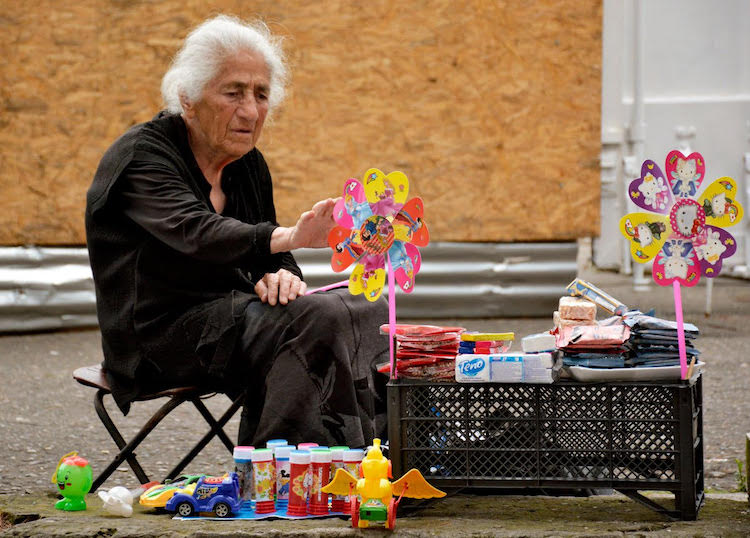By Jaya Ramachandran
BERLIN | BRUSSELS (IDN) – Unless adequate steps are taken with relentless determination, the core objective of the Sustainable Development Goals (SDGs) agreed by all member states of the United Nations in September 2015, which recommend that “no one be left behind”, will not be achieved in Eastern Europe and Central Asia.
This is the crux of a United Nations report titled ‘Progress at Risk‘, published on October 12 in Brussels. Goals 8 and 10 of the SDGs – aiming to “promote inclusive and sustainable economic growth, employment and decent work for all” and “reduce inequality within and among countries” – are being ignored.
With 37 million people in informal or vulnerable jobs – the equivalent of a third of the working population — social safety nets in Eastern Europe, Turkey and Central Asia are increasingly coming under threat, says the report by the United Nations Development Programme (UNDP) covering this region.
The report shows that, while some 80 million people (out of a total population of 230 million) have joined the middle class since 2001, low commodity prices and slow growth in the European Union and the Russian Federation are making it harder for many people to find decent employment or access basic services such as health and education.
The study sees women, migrant workers, the youth and ethnic minorities such as the Roma particularly at risk of falling behind. “Women, for example, are 30 percent less likely to be employed than men, but perform two and a half times more unpaid domestic work.”
Furthermore, AIDS-related deaths have tripled over the last 15 years, in part because prevention and treatment have failed to reach the most marginalized.
“Many of these problems reflect discrimination and exclusion that are not captured in official statistics,” declares the report. In fact, World Bank and Transparency International survey data cited in the report indicate that many people believe in the existence of a two-speed justice system, while a third of respondents said they have paid bribes to get treated medically.
Taking up a rather sensible issue that is often side-lined, Cihan Sultanoğlu, the Director of UNDP’s Regional Bureau for Europe and the CIS (Commonwealth of Independent States) said: “Many countries in this region used to enjoy relative job security, free and universal access to social services and smaller gender inequalities. But with vulnerability and exclusion on the rise, they are starting to resemble societies in other parts of the world.”
The report refers to yet another significant aspect of economic life when it points out that due to misinvoiced foreign trade transactions nearly US$65 billion in annual illicit financial flows leaves the region annually. “By capturing even a small fraction of these funds, governments in Eastern Europe, Turkey and Central Asia could invest huge amounts back into creating jobs, expanding social safety nets and closing the gender gap,” says the report.
Such investments would also help countries of the region implement the global development finance agenda agreed in Addis Ababa in July 2015, which identified increases in domestic resources – including reductions in illicit financial flows – as key to funding sustainable development.
Financing questions are emerging as a major concern in national efforts to implement the sustainable development goals by 2030.
Against this backdrop, Sultanoğlu said: “This report is coming at the right time. Many countries around the world are implementing the Sustainable Development Goals (SDGs), which recommend that no one be left behind. If we can invest in bringing the most excluded and vulnerable groups up to speed, we will increase the prospects of reaching the SDGs in the region by 2030.”
The UNDP report calls for cutting the region’s high labour taxes to encourage formal employment, where social protection coverage and workers’ rights are more secure. In addition, alleviating social care and domestic work could improve education, employment, and earnings opportunities for women. This could in turn accelerate economic growth and improve levels of well-being for everyone, says the report.
In addition, increasing national tax receipts, capturing illicit capital flows and imposing higher taxes on economic activities that burden the environment—such as the extraction and processing of non-renewable fossil fuels—could increase budget revenues and help make the transition to greener economies and more equal societies.
The report also calls for improving the ability of statistical offices to gather reliable and independent data on inequalities, but also to respond to the needs of vulnerable groups more effectively. Such efforts would require more extensive public administration and civil service reforms, says the report. [IDN-InDepthNews – 13 October 2016]
Photo: Vladimer Vaishvili | UNDP Georgia
IDN is the flagship of International Press Syndicate.

